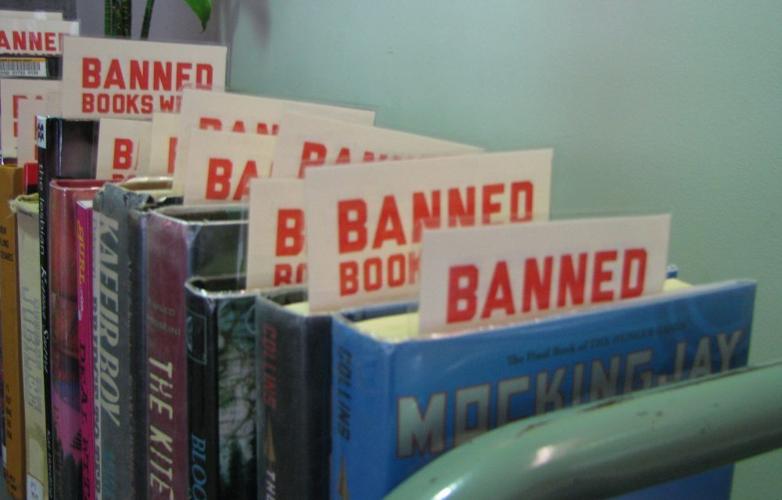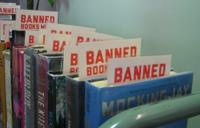
A collection of banned books (from the Kennedy Library)
The federal legal battle over the future of a Florida law that gives parents and others the right to target school library books for removal is moving to the appellate, with an outcome that may have national implications.
Lawsuits challenging House Bill 1069, which was passed two years ago, have had different outcomes depending on the judge. In September, Judge Allen Winsor of the Northern District of Florida concluded that the Escambia County School Board’s decision to remove the children’s book “And Tango Makes Three” from library bookshelves reflected government speech and that the free-speech rights of students or authors were not violated.
But in August, Judge Carlos Mendoza of the Middle District of Florida overturned several provisions of HB 1069, concluding that the law’s obscenity definition was overly vague and that the law expands purview of “pornographic’ into unconstitutional realms.
Another lawsuit filed on behalf of parents argues that HB 1069 is prejudicial since it only permits challenges to books within library collections – but not appeals of decisions that lead to book removals.

Block
Bobby Block, executive director of the Florida First Amendment Foundation, said part of the problem has to do with how state lawmakers approach legislation at the Statehouse in Tallahassee.
“The language they use in the legislation is emotional and overbroad,” Block told the Florida Record, adding that it also creates an environment where they wield too much discretionary power.
“That’s why we’re seeing so many lawsuits,” he said.
Block views supporters of the law as having sincere beliefs about protecting children, but solutions such as HB 1069 are not the way to go about that, according to Block.
The administrations in both Florida and in the federal government have sought to silence voices they don’t like, such as members of nontraditional families, and limit the information people have access to, he said.
Block acknowledged that school libraries may not qualify precisely as public forums. “But that doesn’t mean that individuals give up their First Amendment rights,” he said, adding that the Florida law promotes viewpoint discrimination and that the concept of government speech “does not cancel out everyone else’s right to express themselves.”
Observers in the debate over HB 1069 now must wait to see what arguments are presented at the appellate level.
“I do think it’s a national badge of shame that Florida leads the country in the number of banned books,” Block said. He added that Florida measures can be replicated in other states.
The advocacy group PEN America rated the Sunshine State as first in the nation in terms of the number of book bans it has in place. During the 2024-25 school year, book bans in Florida numbered 2,300, according to the report.
Government retaliation for speech that might be considered despicable, disgusting or abhorrent is un-American, Block said, and that pushing certain viewpoints underground does not make them go away.
HB 1069 supporters have said the measure simply guards against the “sexualization” of children and seeks to limit discussions of gender orientation and sexual identity to within the family unit, as opposed to public-school classrooms.




